It’s hot and sticky and nearly 30 degrees Celsius despite it being “winter.” I am getting attacked by mosquitoes while trying to ask a few questions, but my interviewees are too busy feeding piglets and baby goats their daily intake of milk with baby bottles. The animals are making loud, suckling noises and milk is messily dribbling down their chins. Around me, the other visitors are ooh-ing and ahh-ing. I seem to be the only one not enchanted by the menagerie.
A quest to find real farm-to-table dining in a countryside retreat has brought me to Tainan’s Dakeng Leisure Farm (大坑休閒農場). But I forgot that, like many farms that are open for tourists, there was inevitably going to be some element of kitsch.
In this case, it was the NT$10 cans of animal fodder that you can fling on the ground and watch as doves, ducks, chickens and pigs congregate around and devour their lunch. A giant heart-shape sign made from interwoven rattan and emblazonment with the word “Love” rounds out this pastoral scene and voila!, you have the perfect selfie opportunity. The animals look happy, you look happy and there is no need to get hands-on dirty.
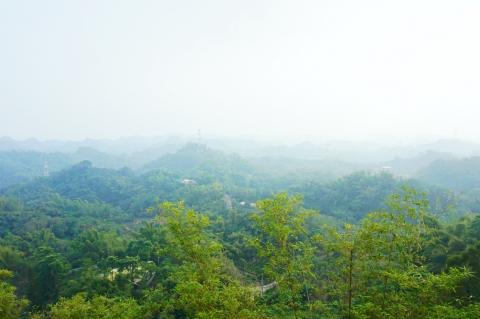
Photo: Dana Ter, Taipei Times
FARMING FUN
Criticisms aside, the leisure farm and its restaurant, which serves home-cooked food from ingredients grown organically on the 10-hectare patch of land, provides a relaxing and healthier alternative to those seeking more than the usual “peddler’s noodles” (擔仔麵, danzimian) and sweet desserts that normally draw visitors to the southern city.
Located a 30-minute drive from Tainan’s high-speed rail station, the farm rests at the foothill of Sinhua District’s (新化) vast mountain range. Shrouded in coconut, banana and bamboo trees, it’s a far cry from the city’s malls, temples and crowded alleys. The sound of roosters crooning and the scent of marigold plants and citrus mint reminds you that this is the real deal.
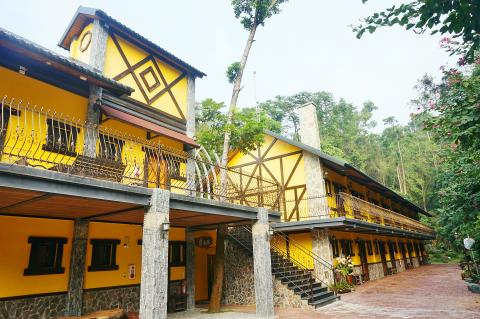
Photo: Dana Ter, Taipei Times
Leisure farms were still a relatively new concept in 1991 when Dakeng welcomed its first visitors. The land has belonged to the family of Tsai Cheng-wen (蔡澄文) for generations and was once used for raising chickens. Tsai converted the place into a leisure farm after he completed his compulsory military service.
Today, Dakeng offers ecological tours where visitors can see how their food is grown. Visitors also have the option to plant crops and cook their own bamboo shoots. Additionally, the farm serves as a petting zoo for families.
“In the past, being a farmer was seen as having a hard life,” Tsai, a middle-aged man with a fit physique from climbing mountains every day, tells the Taipei Times. “I wanted to introduce the idea of farms being a relaxing environment.”
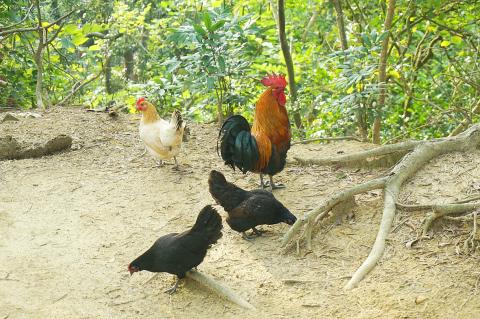
Photo: Dana Ter, Taipei Times
While Tsai takes visitors on guided treks in the mountains, his parents, now in their 80s, are the head chefs in the restaurant. His wife and daughters help in the kitchen and manage public relations and sales and marketing.
Tsai says that visitors who come from big cities such as Singapore and Hong Kong are surprised to learn that feeding pigs and harvesting roselle plants can be educational and fun.
“They realize that nowadays, raising livestock or tending a field doesn’t have such a bad connotation as it did before,” Tsai says.
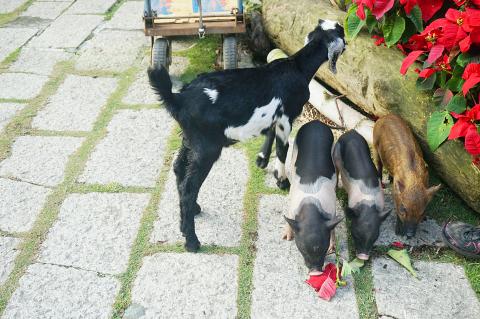
Photo: Dana Ter, Taipei Times
BACK TO BASICS
Occupying the first floor of the main house, a Tudor-style structure with mahogany pillars, the restaurant boasts simple wooden tables and a gray stone floor.
Ingredients grown on the farm make up the restaurant’s dishes, which include bamboo shoots, vegan pasta cooked with rose, baked sweet potatoes wrapped in lettuce, roasted pork skewers with rosemary leaves, chilled mountain vegetables and their specialty — free-range black chicken soaked in herbal stew with enoki mushrooms, which takes three hours to cook. If you’re visiting with a large group, there’s also the choice of the farm’s “grilled mini pig,” but it comes at a hefty price: NT$5,000.
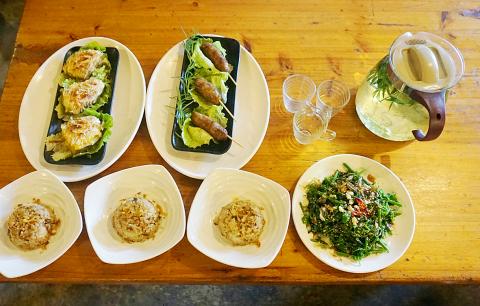
Photo: Dana Ter, Taipei Times
While I enjoyed the warm and pungent marigold-infused tea, the flavors of the vegetable dishes were a bit too earthy for my liking. As a result, I ended up taking a fancy to the meat dishes.
The pork skewers embedded with little pieces of rosemary were delectable and chewy, with just the right amount of herbal undertones. The chicken stew was quite honestly a bit scary-looking — the entire chicken was visible, black, rubbery skin and all — but it was also very tender and gave the soup a natural, herbal sweetness.
The back-to-basics ethos that the farm promotes might have been a little overblown with the vegetables. They were slightly under cooked and not well seasoned. Trying to bite my way out of a shrub isn’t exactly my idea of an enjoyable lunch.

Photo: Dana Ter, Taipei Times
That said, the concept is a good one.
“The guests like how they can see grandpa and grandma bringing the ingredients in from the mountains and cooking the food,” says Tsai Chia-ling (蔡佳玲), Tsai Cheng-wen’s daughter, and also the farm’s sales manager.
MOUNTAIN TREK
After lunch, we are shown the patch of land high up in the bamboo-thicketed mountains where the crops are grown. Tsai Cheng-wen says that the natural environment, notably cleaner air and fresh spring water, makes it ideal for cultivation. He brings us to a spot where rosemary and marigold — two ingredients used in our lunch — are cultivated.
While the rosemary has a pleasant scent similar to pine, the marigold, which is traditionally a crop that’s used to repel insects, is more pleasing to look at, with its bright yellow petals adding color to the lush greenery.
Tsai plucks a few pieces of sweet citrus mint and watercress — other ingredients used in the restaurant’s salads and vegetarian dishes — and tells us to pop them in our mouths. The citrus mint has a saccharine flavor and the watercress tastes like a milder version of wasabi.
While I’m not entirely sold on leisure farms, I’m starting to understand why people, especially other city folk, would find them appealing. The cliched trope of city slickers being able to interact with nature without really getting too dirty holds true, but it’s the commitment of the Tsai family to maintain the land and share their passion for organic growing and healthy eating that makes their leisure farm stand out from the others.
IF YOU GO
GETTING THERE
■ Take the High Speed Rail (HSR) from Taipei Main Station to Tainan Station; the journey takes approximately 1 hour and 30 minutes. A taxi from Tainan HSR costs approximately NT$550 and takes 30 minutes to Dakeng Leisure Farm (台南大坑休閒農場), 82, Dakeng Village, Xinhua District, Tainan City (台南市新化區大坑里82號)
ENTRY FEE AND ACCOMMODATION
■ Entry to the farm is NT$200 per person and includes DIY activities. If you want to spend the night, rooms range from NT$3,040 to NT$9,600 (for 2 to 12 people).
■ More information in English, Japanese and Chinese can be found at: www.idakeng.com.tw
WHAT TO BRING
■ Insect repellent
■ Jeans or long pants, long sleeve shirts
■ Good walking shoes

June 23 to June 29 After capturing the walled city of Hsinchu on June 22, 1895, the Japanese hoped to quickly push south and seize control of Taiwan’s entire west coast — but their advance was stalled for more than a month. Not only did local Hakka fighters continue to cause them headaches, resistance forces even attempted to retake the city three times. “We had planned to occupy Anping (Tainan) and Takao (Kaohsiung) as soon as possible, but ever since we took Hsinchu, nearby bandits proclaiming to be ‘righteous people’ (義民) have been destroying train tracks and electrical cables, and gathering in villages

Dr. Y. Tony Yang, Associate Dean of Health Policy and Population Science at George Washington University, argued last week in a piece for the Taipei Times about former president Ma Ying-jeou (馬英九) leading a student delegation to the People’s Republic of China (PRC) that, “The real question is not whether Ma’s visit helps or hurts Taiwan — it is why Taiwan lacks a sophisticated, multi-track approach to one of the most complex geopolitical relationships in the world” (“Ma’s Visit, DPP’s Blind Spot,” June 18, page 8). Yang contends that the Democratic Progressive Party (DPP) has a blind spot: “By treating any

Swooping low over the banks of a Nile River tributary, an aid flight run by retired American military officers released a stream of food-stuffed sacks over a town emptied by fighting in South Sudan, a country wracked by conflict. Last week’s air drop was the latest in a controversial development — private contracting firms led by former US intelligence officers and military veterans delivering aid to some of the world’s deadliest conflict zones, in operations organized with governments that are combatants in the conflicts. The moves are roiling the global aid community, which warns of a more militarized, politicized and profit-seeking trend

This year will go down in the history books. Taiwan faces enormous turmoil and uncertainty in the coming months. Which political parties are in a good position to handle big changes? All of the main parties are beset with challenges. Taking stock, this column examined the Taiwan People’s Party (TPP) (“Huang Kuo-chang’s choking the life out of the TPP,” May 28, page 12), the Democratic Progressive Party (DPP) (“Challenges amid choppy waters for the DPP,” June 14, page 12) and the Chinese Nationalist Party (KMT) (“KMT struggles to seize opportunities as ‘interesting times’ loom,” June 20, page 11). Times like these can